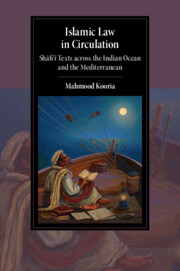Book contents
- Islamic Law in Circulation
- Cambridge Studies in Islamic Civilization
- Islamic Law in Circulation
- Copyright page
- Dedication
- Contents
- Figures
- Acknowledgements
- Notes on Transliteration, Dates and Places
- Chapter
- Introduction
- Chapter
- 4 The Code
- Chapter
- 5 The Commentary
- Chapter
- 6 The Autocommentary
- Chapter
- 7 The Supercommentaries
- Chapter
- 8 The Translations
- Conclusion
- Bibliography
- Index
- Other Titles in the Series:
6 - The Autocommentary
from Part II
Published online by Cambridge University Press: 24 March 2022
- Islamic Law in Circulation
- Cambridge Studies in Islamic Civilization
- Islamic Law in Circulation
- Copyright page
- Dedication
- Contents
- Figures
- Acknowledgements
- Notes on Transliteration, Dates and Places
- Chapter
- Introduction
- Chapter
- 4 The Code
- Chapter
- 5 The Commentary
- Chapter
- 6 The Autocommentary
- Chapter
- 7 The Supercommentaries
- Chapter
- 8 The Translations
- Conclusion
- Bibliography
- Index
- Other Titles in the Series:
Summary
In the legal textual tradition of the Minhāj and the Tuḥfa, a particular subsequent text and its author mark a point from which to analyse Shāfiʿī experiments in the Indian Ocean rim. This chapter considers Fatḥ al-muʿīn, written by Aḥmad Zayn al-Dīn bin Muḥammad Ghazālī al-Malaybārī (d. ca. 1583), an autocommentary on his Qurrat al-ʿayn. Both the base text and the autocommentary form an independent family in the Shāfiʿī textual history with their own textual descendants, while they can also be considered as indirect progenies of the Tuḥfa, for they stimulated the Shāfiʿī legacy of Ibn Ḥajar and his oeuvre on the Malabar Coast and the wider territories around the Indian Ocean. They demonstrate how Indian Ocean Muslims made their way into the textual landscape of Shāfiʿīsm, and even into the heartlands of Islam. They added to the long pattern of Islamic thought in a traditional way and also advanced it. The chapter investigates how it criticised many methods and arguments of its intellectual predecessors and generated a different discourse within the school from its peculiar perspective from Malabar and the Indian Ocean at large.
Keywords
- Type
- Chapter
- Information
- Islamic Law in CirculationShafi'i Texts across the Indian Ocean and the Mediterranean, pp. 227 - 278Publisher: Cambridge University PressPrint publication year: 2022

